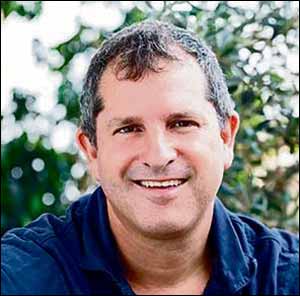|
PROFILE Oren using his magic to share his love of myths | |
The 45-year-old Jerusalem-born father-of-two told me: “When I was 12, we moved to New York City for a number of years. “Soccer wasn’t much of a sport in America in those days, so I just looked good as I was better than the other players. “I was nicknamed the little Israeli magician. It was my true career missed.” But the Tel Aviv-based author and chairman of the graduate programme in science, technology and society at Bar Ilan University admits that music would have been something he would also have loved to pursue. Specifically the piano, which he plays in his spare time — and he sings. “I’m actually a member of the Tel Aviv Chamber Choir,” he said. “I love singing. It’s a hobby to help keep me sane. It’s my second love.” His first love, presumably, is mythology. His new book, Evolutions: Fifteen Myths That Explain Our World (Head of Zeus, £20), published yesterday, explores life’s mysteries with myths, science and facts. And it harks back to Oren’s younger days, when he had a fascination with world mythology. Instead of reading comics or children’s books, Oren was given a book about the famous Greek stories, such as Medusa, Jason and the Argonauts and Odysseus, by his parents. And he was hooked. He said: “I’d always been interested by myths. I was taken in by the Greeks myths. “Take any myth you like, such as Icarus — why did he fly so close to the sun, even though his father told him not to do so? “It seemed to me to be about hubris, but also about curiosity. I couldn’t always control my own. “When I went to school, I started studying science, but would also go to the Natural History Museum in New York and look up at the dinosaurs, thinking ‘could it really be that our ancestors were once these tiny shrews running in the shadows of this dinosaur?’. “To some degree, the mystery of mythologies and the mystery of science were just one and the same to me. “They seemed like they were both getting at something deep about our humanity.” Oren is the grandson of Abraham Harman, Israel’s ambassador to America during the Six-Day War, and later a president of the Hebrew University, and Zena Stern Harman, who served as a Knesset member for the Labour Alignment. Oren, who is married to Yael, has also forged a successful career as an author, having written several books, including The Man Who Invented the Chromosome, Rebels, Mavericks and Heretics in Biology, Outsider Scientists, Dreamers, Visionaries and Revolutionaries in the Life Sciences and Handbook of the Historiography of Biology. His 2010 work, The Price of Altruism, won the 2010 Los Angeles Times Book Prize for best book of the year in science and technology, was nominated for the Pulitzer Prize, and was a New York Times notable book of the year. But back to his current work, it might come as a shock to any scientists reading this piece, but science does not have all the answers, Oren points out. But neither does mythology. Hence why the two go together so well. “When I went to Hebrew University, where I studied biology, it seemed like, at the beginning of the 17th century, science promised to be a replacement for mythology,” he said. “The ancients had all kinds of crazy thoughts about where the universe came from — the Chinese thought it hatched from an egg and the Maori people thought that it came from the taking apart of a loving embrace from the sky and the earth. “And now science provides the actual solutions and objective observations, and yet it seems that they are just as mysterious as the myths. “The book came from how we use our modern day scientific idioms in order to hark back to the age old themes of world mythologies, such as where we came from, the meaning of death and morality etc. “They are very difficult questions which don’t have easy answers or any answers at all. “What I’m trying to do is to say that, even though science has fashioned itself as a replacement to mythology, there are many important questions which can not be answered by science.” As well as attending Hebrew University, Oren is also an alumni of Oxford and Harvard universities. But what of religion in the battle between science and mythology? After a pause, Oren replied: “The matter of myths is more profound than the material of morality. “The Latin word for religion is religare, which means to bind, so there is something functional about religion — it binds us together. “But myths are more about men and women standing before the universe in awe. “Myth graduated into religion, historical, but it comes first. “Myth is more personal and is about us trying to make sense of what can not be explained.” There is a myth, Oren added, about sex and gender which state that the price we pay for these is that we die. He explained: “What gave us sex and the pleasure of it, as well as the intrigue of different genders is also what kills us. “The logic of evolution ordains, because of the chicken and the egg, that ignorance of our future is the price for having a future. “When life got started, you needed to have random mutations for natural selection to work on them. “They had to be random, which means that never knowing our future is built into our existence. “How we think about the meaning of life surfaced while I was putting my latest book together. “Researching for the book taught me a lot.”
If you have a story or an issue you want us to cover, let us know - in complete confidence - by contacting newsdesk@jewishtelegraph.com, 0161-741 2631 or via Facebook / Twitter
|
